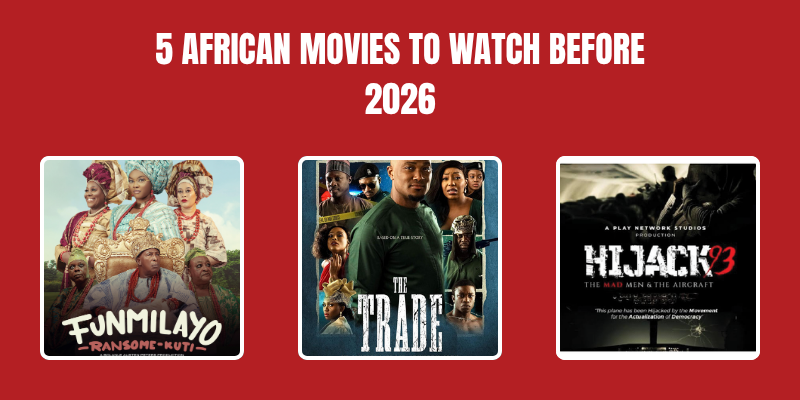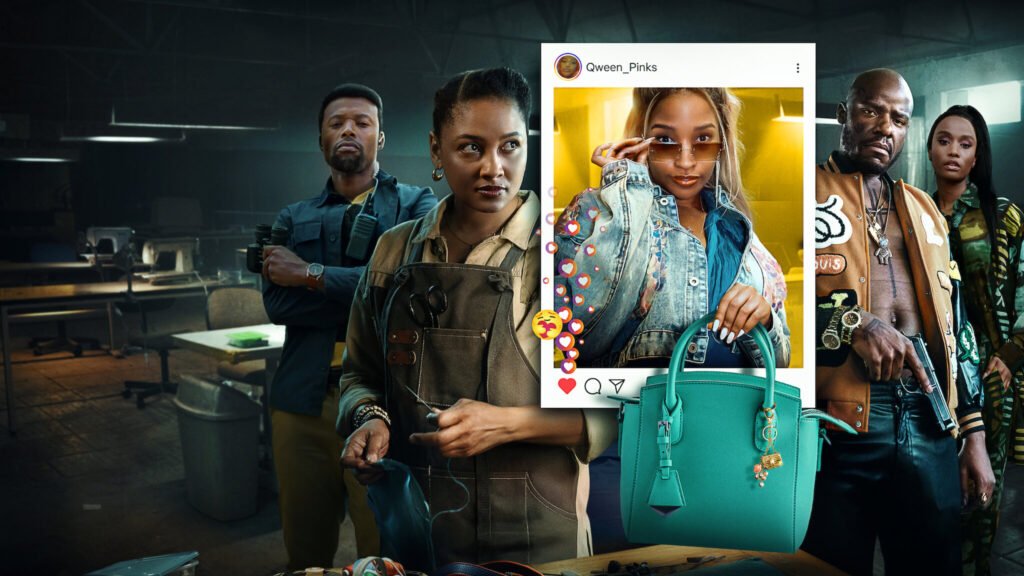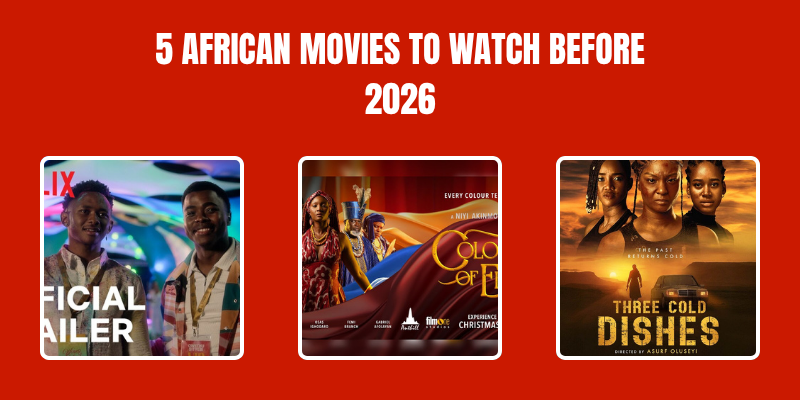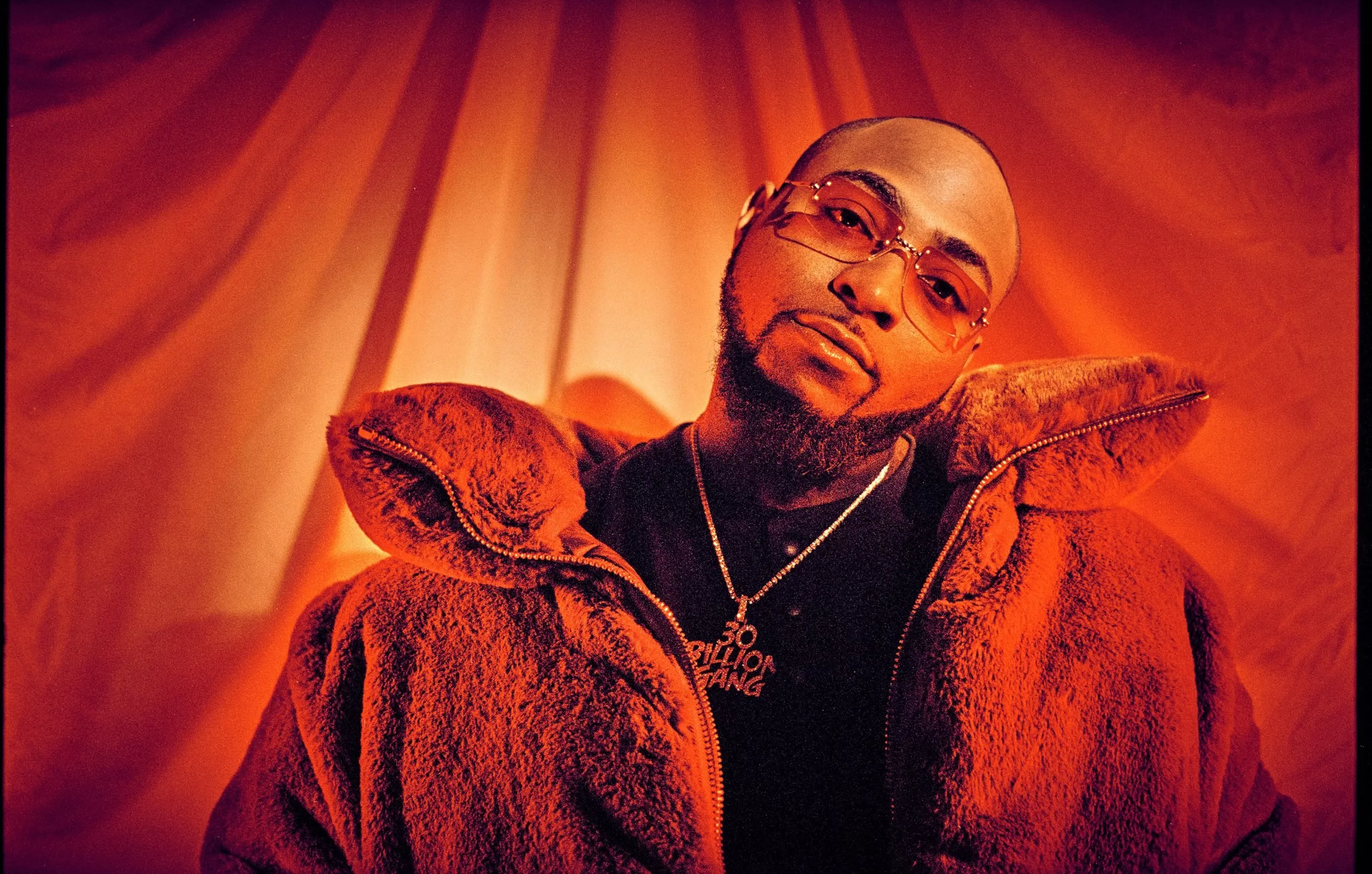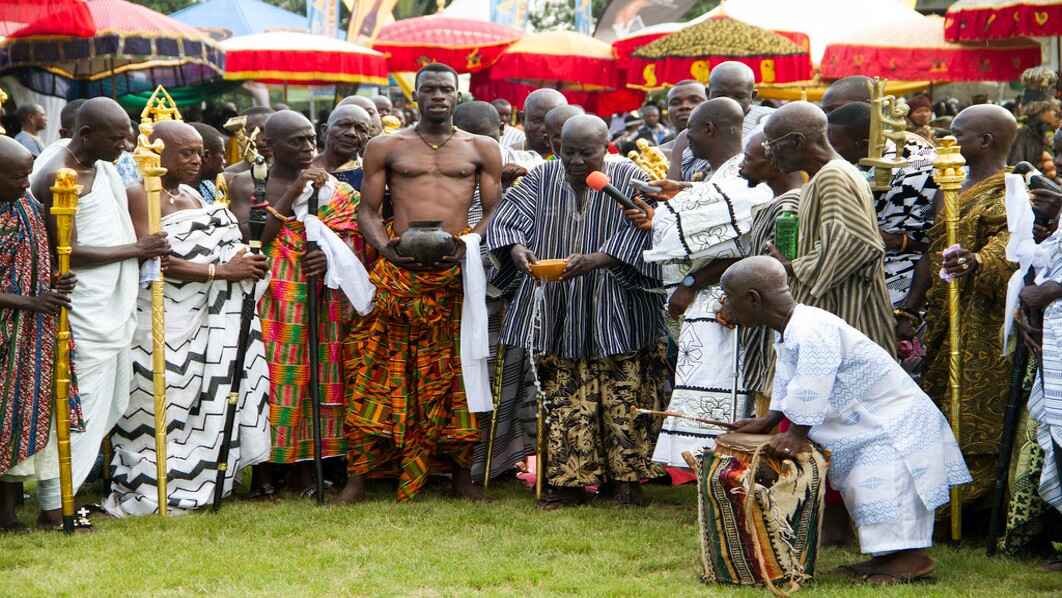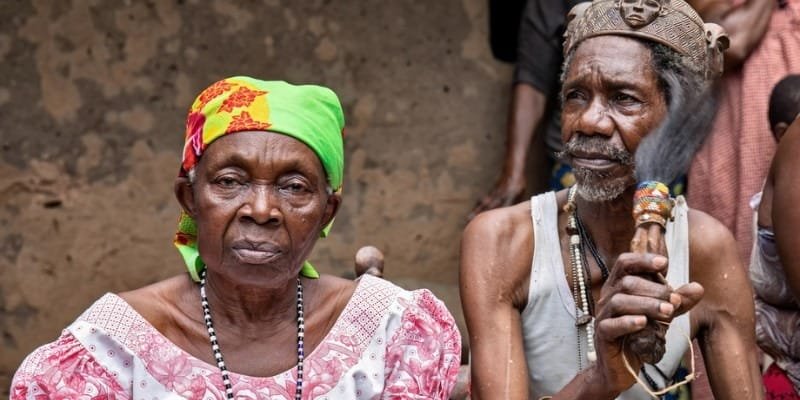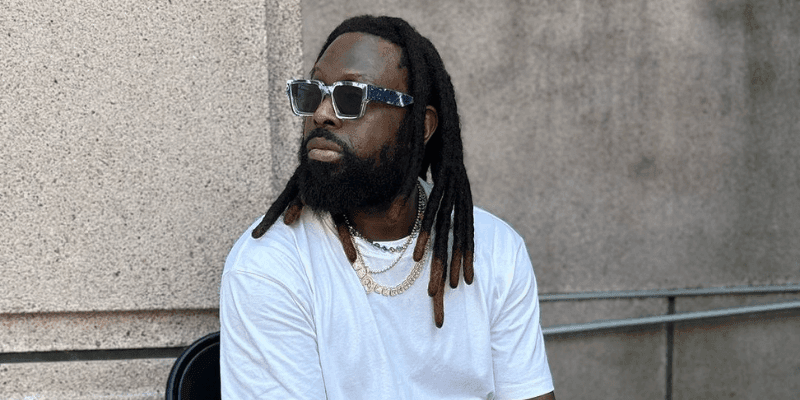There’s a new wave running through Nollywood: call it realism with a twist. Gone are the days when every movie had the same formula: love triangle, ritual money, and one long dramatic slap. Now, filmmakers are digging into Nigeria’s messy reality – the headlines, the heartbreaks, and the history – and spinning stories that make you laugh, ache, and question everything at once.
These recent films didn’t just aim to entertain; they sought to convey a deeper meaning. From hijackings to historical icons, here are some real-life-inspired movies that shook things up for better or for “hmm, you could’ve done better, sha.”
Dark October (2023)
Dark October was directed by Toka McBaror and produced by Linda Ikeji. The film starred Chuks Joseph, Munachi Okpara, Kelechukwu Oriaku, and Kem-Ariye Ebiye as main actors.
Linda Ikeji’s first major production went straight for the jugular, with no romantic subplot, no comic relief, just pure tragedy. Dark October re-creates the 2012 Aluu Four incident, when four university students were wrongly accused of theft and lynched by a mob in Port Harcourt. It’s the kind of story Nigerians wish had stayed fiction, but it didn’t.
Why it hit: The performances were haunting. Chuks Joseph carried grief like a second skin, and Munachi Okpara sold fear so convincingly you could feel your stomach knot. The cinematography was stark, no glamour filter, just pain and chaos.
The reality connection: This wasn’t just about those four boys; it was about a country where rumour spreads faster than justice. The film forces viewers to confront how quickly outrage turns deadly.
Where it flopped: Some viewers felt it was too literal, almost a documentary without the emotional breathing space a drama needs. It could’ve dug deeper into why people become mobs, instead of just showing that they do. Still, for a debut production, it started conversations that needed to happen.
Hijack ‘93 (2024)
Directed by Robert O. Peters, Hijack ‘93 featured Nancy Isime, Allison Emmanuel, Femi Branch and many others.
Yes, a Nigerian hijack movie. Inspired by the real-life 1993 hijacking of a Nigerian Airways flight from Lagos to Abuja, Hijack ’93 is part political thriller, part time capsule. The story reimagines the passengers, the panic, and the political motives behind the act, something Nigeria’s history books have barely unpacked.
Why it hit: Nancy Isime shines (again) as a passenger caught between fear and fight. Her calm-under-pressure energy gives the movie its emotional pulse. And the attempt to recreate ’90s aviation — the uniforms, the airport vibe, the old-school phone calls — was top-tier nostalgia.
The reality connection: It reflects the tension of early-’90s Nigerian military rule, political unrest, and people desperate to be heard. The hijacking wasn’t just a stunt; it was a cry for visibility, and you could even say, help.
Where it flopped: The CGI turbulence was… turbulent. Let’s be honest: Nollywood’s still catching up to the physics of plane explosions. And while the script carried ambition, the dialogue sometimes lagged behind the intensity of the plot. But credit where it’s due, it’s not easy pulling off an aviation thriller on a Nollywood budget.
The Trade (2023)
The Trade was directed by Jade Osiberu. Talented casts like Blossom Chukwujekwu, Rita Dominic, Stan Nze, and Ali Nuhu were featured in this movie.
You know a story’s good when you start questioning your own morals halfway through. The Trade takes inspiration from real-life reports of a master kidnapper who evaded capture for years; it’s a blend of crime, psychology, and small-town fear. Jade Osiberu doesn’t just show the kidnapping; she explores the mindset behind it.
Why it hit: Blossom Chukwujekwu’s performance was magnetic, cold, and calculating but disturbingly human. He’s the kind of villain you secretly root for, which is dangerous and brilliant at the same time. Rita Dominic brought elegance and authority to her role as a negotiator who won’t back down.
The reality connection: Kidnapping is a brutal reality in Nigeria, a business for some, a nightmare for others. The film doesn’t romanticise it, but it does show how systemic poverty and police inefficiency create monsters out of men.
Where it flopped: The pacing. Some parts felt stretched, like the film didn’t know when to quit flexing. A few scenes dragged when the tension should’ve snapped tighter. Still, The Trade proved Jade Osiberu’s range extends far beyond romance (Isoken, who?).
Lísàbí (2024)
Directed by Niyi Akinmolayan. Lísàbí featured pure talents like Lateef Adedimeji, Bukunmi Oluwashina, Odunlade Adekola, Gabriel Afolayan and many others.
Now this, this was Nollywood saying, “Yeah, we can do epics too.” Lísàbí goes back in time to tell the story of a real Yoruba hero, Lísàbí Agbongbo-Akala, the Egba warrior who led his people to break free from the choking grip of the Oyo Empire. Split into two parts (The Uprising and A Legend Is Born), it’s Niyi Akinmolayan’s loudest love letter yet to Yoruba heritage, complete with war chants, lush forests, and dialogue so drenched in culture you almost feel like you should be watching it with a talking drum playing softly in the background.
Why it hit: Lateef Adedimeji showed up ready to make history. He doesn’t just play Lísàbí, he is Lísàbí. You can see the weight of leadership in his eyes, the fire in his battle cries, and the exhaustion that comes from fighting both enemies and expectations. Bukunmi Oluwashina brings quiet strength (and thankfully, not the usual damsel-in-distress energy), while Odunlade Adekola and Gabriel Afolayan round out the cast like seasoned warriors who actually belong in that era.
Visually, the movie is a feast, the costumes slap, the setting feels grand, and the cinematography is easily one of the best things Akinmolayan’s done. The soundtrack? It was on point. One area where the sequel (A legend is born) scores points is in the backstory department. If you thought Lisabi’s jump from farmer to god-calling warrior in The Uprising came out of nowhere, this movie finally fills in those gaps. It gives his character more depth and makes his transformation feel earned.
The reality connection: Beneath the swords and chants lies a very Nigerian story (Egba people), one about oppression, power, and the eternal struggle for freedom. The real Lísàbí’s rebellion wasn’t just a war; it was a people’s awakening, and the film mirrors that spirit perfectly. It’s part history lesson, part wake-up call.
Where it flopped: Ambition can be a blessing and a curse, and Lísàbí trips over its own crown a few times. The pacing? Choppy. Some scenes drag like a council meeting that should’ve been an email. And while the visuals are bold, a few CGI shots, especially in battle sequences, felt like the budget had gasped halfway through. The emotional core sometimes gets lost in all the grandeur; you’re watching the legend unfold, but not feeling his inner chaos enough. Still, for Nollywood to even attempt a historical epic of this scale and make it look this good deserves respect. It’s not flawless, but it’s fierce, and it’s a reminder that African history can look every bit as cinematic as Greek mythology.
Funmilayo Ransome-Kuti (2024)
Directed by Bolanle Austen-Peters, this film Starred Kehinde Bankole, Joke Silva, Omowunmi Dada and Ibrahim Suleiman
Now this one? Pure heritage cinema. Funmilayo Ransome-Kuti isn’t just a biopic; it’s a cultural resurrection. It tells the story of the legendary activist, teacher, and mother of Fela Kuti, who stood up to both colonialists and the patriarchy before feminism had a hashtag.
Why it hit: Kehinde Bankole embodied Funmilayo’s fierce intellect and resilience. Joke Silva’s seasoned grace anchored the film, while Omowunmi Dada added spark as a younger generation watching a trailblazer redefine womanhood. The production design was beautiful; the costumes, the dialects, and the music all screamed authenticity.
The reality connection: This is Nigeria’s feminist history told with colour and rhythm. It shows how one woman’s courage could ripple through generations, from women’s suffrage movements to modern-day activism.
Where it flopped: Like many biopics, it sometimes played it too safe; more saint than human. There were moments you wanted the camera to linger on her fears, her mistakes, and her messy humanity. Still, it’s a proud moment for Nollywood, proof that history can be cinematic, not just academic.
If Nollywood once survived on melodrama and slapstick, this new chapter is proof of evolution. Dark October reminded us of our collective silence; Hijack ’93 captured a forgotten rebellion; The Trade questioned morality; and Funmilayo Ransome-Kuti celebrated legacy.
Do they all hit perfectly? No. But they’re trying, and that’s what’s exciting. They’re taking risks, blending truth with artistry, and refusing to keep Nigerian stories on mute. And that, honestly, is the kind of realism we’ve been waiting for.







